1. Background
What is AI Agent?
AI Agent is an intelligent entity that can perceive the environment, make decisions and perform actions, mainly based on LLM (Large Language Model). It has autonomy and adaptability, can independently complete complex tasks, and demonstrates highly intelligent collaboration capabilities. Compared with traditional large models, which require clear instructions to interact, AI Agent can autonomously decompose tasks, plan action steps, and call tools to complete tasks during execution after receiving target instructions. Its core advantage lies in its ability to think and act independently. Compared with early voice assistants such as Siri and Microsoft's Copilot, AI Agent is more like a primary "master driver" that can continuously improve the efficiency and accuracy of task completion through autonomous learning, feedback adjustment, and long-term optimization.
The working principle of AI Agent can be summarized into four core capabilities: perception, analysis, decision-making and execution. First, AI Agent perceives the environment through sensors or data interfaces to obtain external information. Subsequently, it uses analytical tools such as large language models to extract valuable features and patterns. Based on the analysis results, AI Agent formulates a reasonable action plan, and finally converts the decision into specific actions to complete the target task. In this process, short-term and long-term memory modules provide it with information storage and backtracking functions, enhancing its ability to cope with complex tasks. In addition, AI Agent dynamically calls external tools (such as calendars, search engines, program interfaces, etc.) according to task requirements, solving the limitations of traditional large models that are limited by static training data and tool dependence, and significantly improving the scalability of model capabilities.
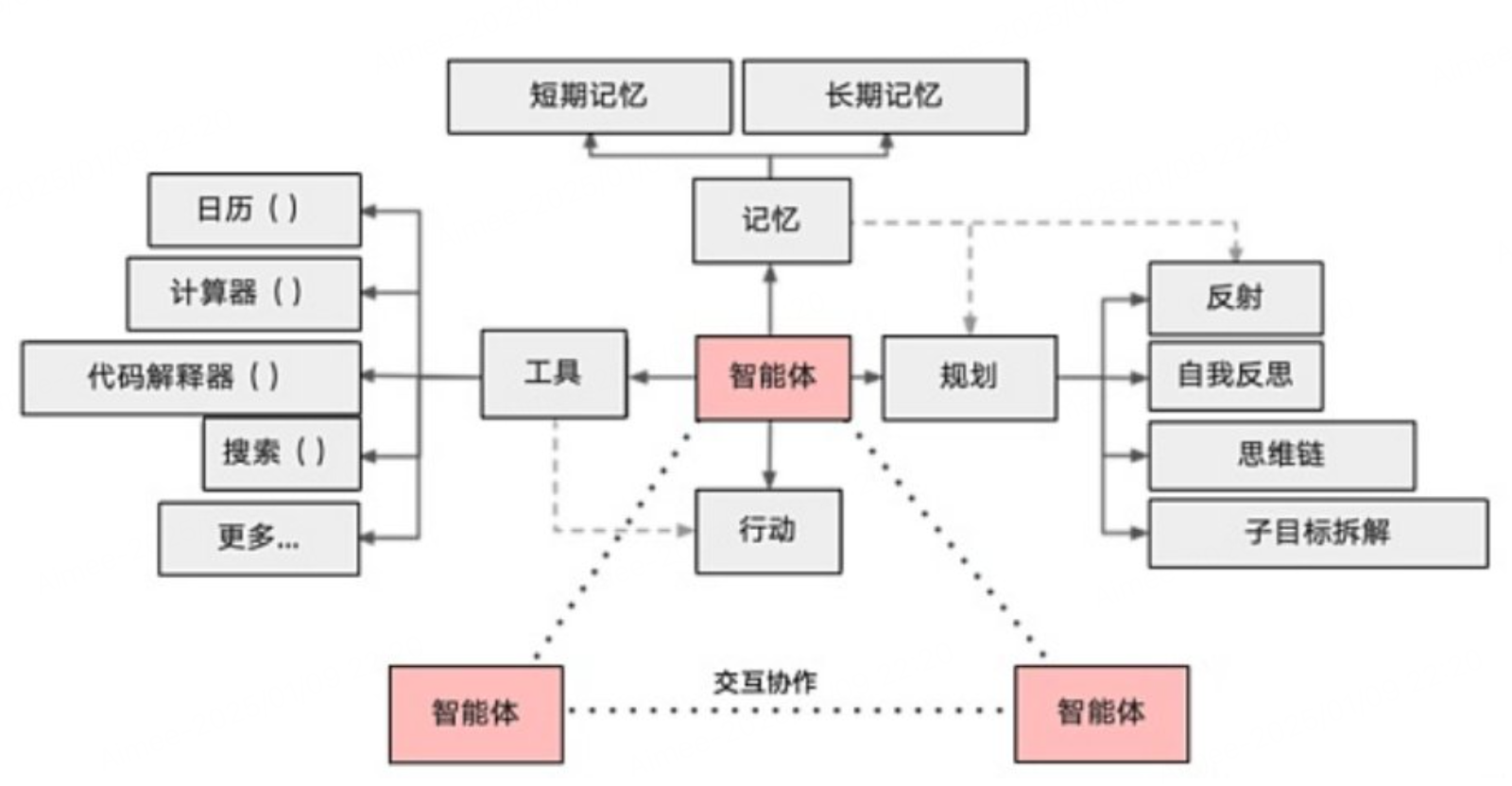
Image source: Lilian Weng, former chief security researcher at Open AI, "LLM Powered Autonomous Agents"
Overview of the development of AI Agent in Web2
In 2025, the AI Agent industry is in a critical period of accelerated development. From the perspective of the industry chain, the upstream is dominated by computing power and hardware providers, data suppliers, and algorithm and large model developers, such as technology giants such as NVIDIA; the midstream focuses on the integration and platform services of AI Agents; the downstream is gradually showing a diversified development trend around the development and promotion of industry vertical applications and general intelligent bodies. At the application level, both the C-end and B-end markets show great potential: C-end applications focus on improving user experience and bringing more convenient ways of interaction, while the B-end is committed to promoting the intelligent transformation of enterprises and enabling business decision-making and operations by reducing costs and increasing efficiency.
Leading companies in the industry have begun to compete fiercely in the application of AI Agents. Google released Gemini 2.0 and launched three AI Agent products: Project Astra (general purpose), Project Mariner (browser operation) and Jules (programming). Sam Altman of OpenAI said that 2025 will be the year when AI Agents become mainstream, and announced that it will soon launch a number of innovative technologies including AGI, upgraded version of GPT-4o and personalized functions. NVIDIA CEO Huang Renxun predicted that AI Agents are expected to become the next robotics industry and create trillions of dollars in market value.
The concept of AI Agent in blockchain
The rise of AI Agent in blockchain is the product of the continuous integration and development of blockchain technology and AI. As a decentralized infrastructure, blockchain provides a reliable data record and transparent behavior verification mechanism for the operation of AI Agent. The development of AI technology enables intelligent agents to have complex judgment and execution capabilities, and can independently complete a series of economic behaviors, like a virtual economy that can operate autonomously. Under this framework, AI Agent can not only participate in the existing ecology of blockchain, but also promote innovation in more scenarios, such as automatically completing market analysis, planning and execution of tasks through smart contracts in DeFi, or creating and managing digital assets as a "resident" in the virtual world.
In addition, the application of AI Agent in blockchain directly improves user experience and production efficiency, especially in the field of complex on-chain operations. One of the biggest obstacles to the popularization of blockchain is the complexity and high threshold of operation. The natural language interaction mode of AI Agent can complete wallet management, screening the best DeFi investment plan, cross-chain transactions, or automatically execute plans according to market conditions through simple instructions, greatly reducing the learning cost of new users, while significantly improving efficiency and convenience.
The potential of AI Agent in the blockchain ecosystem is not only reflected in the optimization of user operations, but also in a wider range of application scenarios. Creator economy, market sentiment monitoring, smart contract auditing, decentralized autonomous organization (DAO) governance voting, and even the issuance of MEME coins can all achieve higher efficiency and fairness through AI Agent. AI Agent's performance in de-emotionalization and precise execution makes it more reliable than most people under given conditions. At the same time, the immutability of blockchain also provides AI with a credible source of data, which makes up for the risks that AI systems may bring due to data quality issues. Furthermore, by utilizing on-chain data and computing power, AI Agent has the potential to subvert the existing incentive model and promote deep-level changes in the blockchain ecosystem.
2. Application of AI Agent in Blockchain
1. AI Agent Framework
The AI Agent framework is a basic tool for developing, training, and deploying intelligent agents, providing developers with technical support for efficiently building intelligent agents. These frameworks reduce development complexity through standardized development environments and common components, allowing developers to focus on the implementation of innovative features. At present, the AI Agent framework is gradually integrating DeFi protocols, NFT projects, etc., exploring cross-platform collaboration and interoperability. For example, by combining DeFi to optimize investment strategies or developing intelligent tools with NFT, the AI Agent framework is building a more open and interconnected ecosystem and has become the focus of market attention. Representative projects: Ai16z, ARC, Swarms, Zerebro, etc.
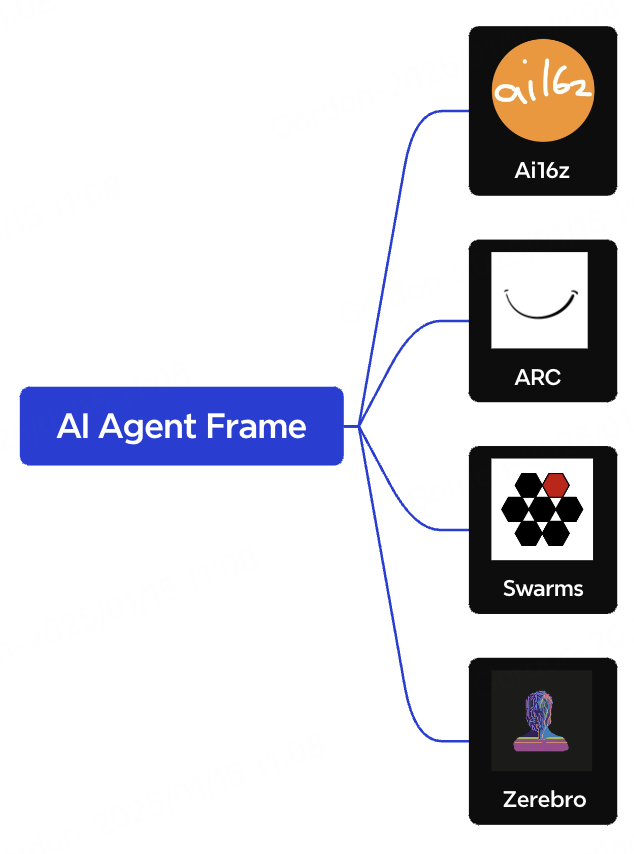
2. AI Agent Launchpad
AI Agent Launchpad is a platform for issuing AI agents and their related tokens, similar in function to Meme coin issuance platforms such as Pump.fun. Users can easily create and deploy AI Agents on these platforms, and seamlessly integrate them with social media platforms such as Twitter, Telegram, and Discord to achieve automated user interaction. This model lowers the threshold for issuance and promotion, brings users a more convenient creation experience, and expands the application scenarios of AI Agents. Representative projects: Virtuals, Clanker, etc.
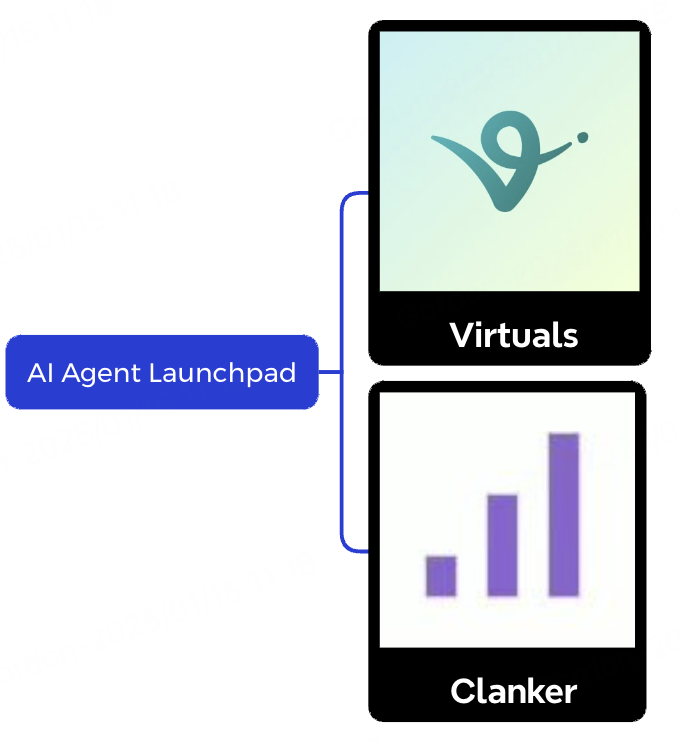
3. AI Agent Application Scenarios
The direct application areas of AI Agent include investment, entertainment, data analysis, etc., showing great growth potential.
Fund Management
AI Agent has transformed from an auxiliary tool to the core of value creation in fund management. It can formulate investment strategies, adjust asset allocation, and predict market trends in real time. These intelligent agents improve the efficiency of tasks such as arbitrage and risk hedging through automated operations, meet the needs of scale and specialization in the crypto market, and inject new competitiveness into fund management. Representative projects include AIXBT, Ai16z, etc.
DeFAI: The combination of AI and DeFi
DeFAI simplifies the operation process and lowers the entry threshold by introducing AI technology into DeFi. Users can issue simple instructions in natural language, such as "complete cross-chain transactions with one click" or "set a regular investment plan", to achieve more efficient asset management and trading operations. The main applications of DeFAI include cross-chain operation optimization, autonomous trading agents, and intelligent information analysis. It has been implemented in multiple platforms such as Griffain, Orbit and Neur, with representative projects: GRIFFAIN, BUZZ, NEUR, etc.
DAO Automated Management
The application of AI Agent in DAO includes voting decision optimization and governance automation. For example, Ai16Z DAO uses intelligent agents to raise funds and manage investments, demonstrating the potential of AI in decentralized autonomy. Such applications not only improve governance efficiency, but also significantly reduce the time and energy investment of members.
game
AI Agent can also be used in game design. By simulating the behavior of players, AI Agent can help game developers optimize game design and improve the fun and playability of games. In addition, AI Agent can be used as a game auxiliary tool to help players improve their gaming skills. For example, AI Agent can analyze the player's operating habits and provide targeted suggestions and guidance to help players improve their gaming skills. Representative projects: HYPER, etc.
Automated quantitative trading
In the field of quantitative trading, AI Agent can develop diversified strategies according to market conditions, such as executing arbitrage trading in high volatility markets or adopting trend following strategies in trending markets. Combined with the exchange's support for automated trading tools, AI Agent has broad application potential in future trading.
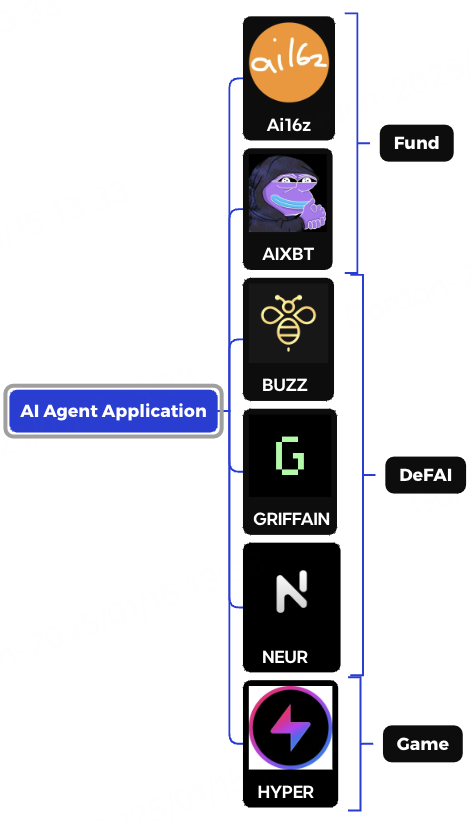
4. AI MEME Project
AI MEME is a Meme coin project derived from the concept of AI Agent. Its core usually has no deep technical or product support. Such projects rely on Meme culture and attract attention with high volatility and speculation. Although the technical content is limited, its market popularity and community sentiment have driven short-term explosive growth, becoming a special phenomenon in the crypto market. Representative projects: GOAT, ACT, etc.
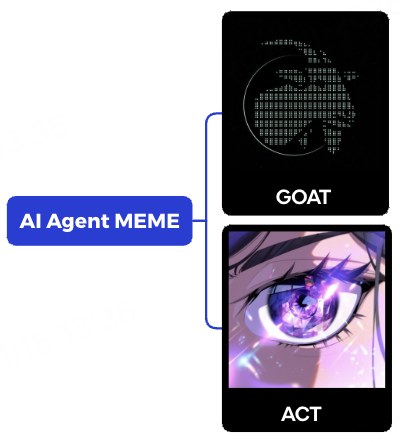
3. Future Development Trends
In 2025, the development of AI Agent in the fields of encryption and Web3 is expected to usher in an important outbreak point. From the tool attributes of single applications to the construction of a multi-agent collaborative ecosystem, the boundaries of AI Agent technology are constantly expanding. In the field of DeFi, AI Agent has realized fund management and smart contract execution, and is expected to become an intelligent entity with autonomous economic capabilities in the future, participating in more complex economic activities and achieving economic autonomy. In DAO, AI Agent can optimize governance efficiency and decision-making processes, while in quantitative trading, it can execute efficient arbitrage and risk management strategies through real-time data analysis. With the improvement of frameworks and standards, the collaboration between AI Agents will give rise to new application scenarios, such as Agent social networks, economic settlement gateways, and governance DAOs, pushing the encryption ecosystem towards a new stage of intelligence and efficiency. At the same time, the development of AI Agent in Web3 also faces challenges and opportunities. Privacy and security have become key issues, especially in the context of AI's increasing reliance on personal data. Web3 provides a unique advantage of ensuring data privacy and security through blockchain, enabling AI Agent to be more widely used in industries with high privacy requirements such as medical care and finance. In addition, computing power and data costs are bottlenecks faced by multi-agent collaboration, but through blockchain and token economy, idle computing power and data resources can be effectively integrated to lower the threshold for development and operation. Looking to the future, AI Agent has the potential to serve as a new infrastructure for Web3, deeply integrated with other core elements, create new application models, upgrade from a tool role to an indispensable ecological pillar, and inject more innovation and value into the crypto industry.















